
Between Forbearance and Audacity
The European Court of Human Rights and the Norm against Torture
Seiten
2023
Cambridge University Press (Verlag)
978-1-009-10004-5 (ISBN)
Cambridge University Press (Verlag)
978-1-009-10004-5 (ISBN)
Through legal and social science-based analyses, this book explains why international courts underutilize their power and traces how this impacts international norms. Using the norm against torture and inhumane or degrading treatment as an example, it systematically analyses c.2,300 judgements from the European Court of Human Rights, 1967–2016.
When international courts are given sweeping powers, why would they ever refuse to use them? The book explains how and when courts employ strategies for institutional survival and resilience: forbearance and audacity, which help them adjust their sovereignty costs to pre-empt and mitigate backlash and political pushback. By systematically analysing almost 2,300 judgements from the European Court of Human Rights from 1967–2016, Ezgi Yildiz traces how these strategies shaped the norm against torture and inhumane or degrading treatment. With expert interviews and a nuanced combination of social science and legal methods, Yildiz innovatively demonstrates what the norm entails, and when and how its contents changed over time. Exploring issues central to public international law and international relations, this interdisciplinary study makes a timely intervention in the debate on international courts, international norms, and legal change. This book is available as Open Access on Cambridge Core.
When international courts are given sweeping powers, why would they ever refuse to use them? The book explains how and when courts employ strategies for institutional survival and resilience: forbearance and audacity, which help them adjust their sovereignty costs to pre-empt and mitigate backlash and political pushback. By systematically analysing almost 2,300 judgements from the European Court of Human Rights from 1967–2016, Ezgi Yildiz traces how these strategies shaped the norm against torture and inhumane or degrading treatment. With expert interviews and a nuanced combination of social science and legal methods, Yildiz innovatively demonstrates what the norm entails, and when and how its contents changed over time. Exploring issues central to public international law and international relations, this interdisciplinary study makes a timely intervention in the debate on international courts, international norms, and legal change. This book is available as Open Access on Cambridge Core.
Ezgi Yildiz is an Assistant Professor at California State University, Long Beach, and a Research Associate at the Geneva Graduate Institute. She is a member of the Expert Group for the EU's Anti-Torture Regulation and the Coordinating Committee of ESIL's Interest Group on Social Sciences and International Law.
1. The court redefines torture in Europe; 2. The conditions for audacity; 3. Inside the court: its trade-offs and zone of discretion; 4. Mapping out norm change; 5. From compromise to absolutism? Gradual transformation under the old court's watch; 6. New court, new thresholds, new obligations; 7. Change unopposed: the court's embrace of positive obligations; 8. Legal change in times of backlash; 9. Conclusion; 10. Bibliography.
| Erscheinungsdatum | 07.11.2023 |
|---|---|
| Reihe/Serie | Studies on International Courts and Tribunals |
| Zusatzinfo | Worked examples or Exercises |
| Verlagsort | Cambridge |
| Sprache | englisch |
| Maße | 159 x 235 mm |
| Gewicht | 530 g |
| Themenwelt | Recht / Steuern ► EU / Internationales Recht |
| Recht / Steuern ► Öffentliches Recht ► Völkerrecht | |
| Sozialwissenschaften ► Politik / Verwaltung ► Europäische / Internationale Politik | |
| ISBN-10 | 1-009-10004-1 / 1009100041 |
| ISBN-13 | 978-1-009-10004-5 / 9781009100045 |
| Zustand | Neuware |
| Haben Sie eine Frage zum Produkt? |
Mehr entdecken
aus dem Bereich
aus dem Bereich


